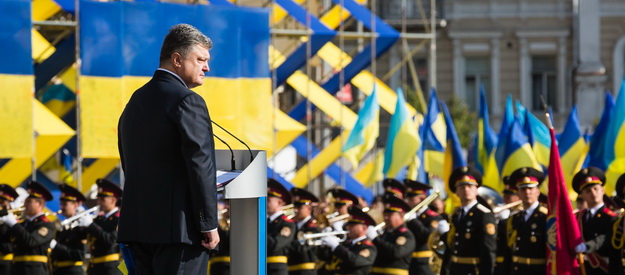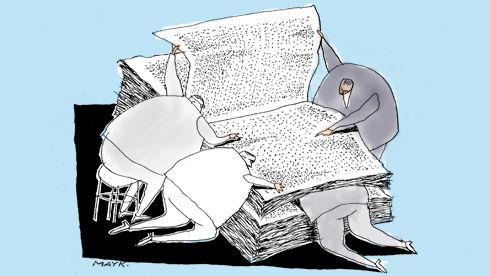This is the first comprehensive analysis of the changes and transformation which took place in Ukraine after the Euromaidan revolution which includes not only the successes but also challenges, where reforms are stalling or being imitated. Apart from an analysis of achievements, the report features a number of priorities for Ukraine and the West: where efforts must be concentrated, in which questions Ukraine needs help the most, how the current strategy of the West should change etc.
Importantly, this work has been undertaken by an international expert center, the authority of which goes without question in all world capitals. The Chatham House had been focusing its efforts on Ukrainian reforms for quite some time already: this summer, it co-organized a conference in London dedicated to Ukrainian reforms. With the permission of Chatham House, Euromaidan Press is publishing a shortened summary of the investigation. The full text is available on the website of the Institute.

Four years since the start of its ‘Euromaidan’ revolution, Ukraine is fighting for its survival as an independent and viable state.
But this report is not only about Ukraine’s struggle to hold together and resist Russia’s interference and pressure – in the military, diplomatic, economic and media spheres. It is also about a related internal contest to determine the political, institutional and civic future of Ukraine.
The country has not succumbed, despite grievous loss of life and territory, to Russian military aggression: it has sealed a landmark Association Agreement with the EU, undertaken deeper and more extensive reform in the past four years than in the previous 22 of its post-Soviet life. Civil society’s contribution to many of these endeavors has been crucial.
Resistance to reform remains widespread even among those in high office, and there are recent signs that anti-progressive forces are becoming emboldened in their attempts to block or dilute the policies Ukraine needs to develop its economy, establish a truly independent judiciary, and provide meaningful deterrents to corruption.
Ukraine’s future and fate hinge upon a transformation of the relationship between citizens, the economy, and the state. Both national security and political legitimacy are at stake. The West’s credibility and cohesion are also at stake – it has invested heavily in Ukraine’s future and spent billions of dollars on supporting the country while rejecting the Russian claim to primacy in deciding Ukraine’s fate.
This report puts forward recommendations to ensure the trust of Ukraine’s partners is retained or strengthened.
Ukraine’s principal challenges
1. Security and defense
Despite three-and-a-half years of multi-variant war against Russia and its separatist allies, Ukraine has demonstrated an internal robustness that few predicted in 2014. Thus far, its sense of national purpose has been humbled neither by Russian arms nor by Ukraine’s unscrupulous system of power.
Worries that the West will succumb to ‘Ukraine fatigue’ or the lure of ‘grand bargains’ with Russia have not been borne out. The West has provided critical support in four areas: diplomacy, anti-Russian sanctions, economic and reform assistance, and defense cooperation. Although this has produced some dividends, more can be done in the political and defense spheres.
But neither Ukraine’s own resistance nor Western steadfastness has dislodged Moscow’s perceptions that Ukraine is an extension of the homeland and a tool of Western efforts to enfeeble Russia and overthrow its regime.
Russia’s tenacity and adaptability should not be underestimated. The appearance of stalemate in the parts of Ukraine’s eastern region of Donbas occupied by pro-Russian separatists should not distract from other means that Russia is employing to sabotage and ‘reset’ Ukraine.
It is an illusion to believe that diplomatic formulas alone will diminish Russia’s determination to dominate Ukraine. Russia’s calculations will change only when core elites perceive that continuing the present course is no longer feasible.
2. Reforms. Eurointegration
The Euromaidan revolution and the conclusion of the EU’s Association Agreement and Deep and Comprehensive Free Trade Agreement, the EU has significantly stepped up its assistance to Ukraine and is involved in almost every aspect of reforms. However, at the operational level, EU assistance is still delivered via a large number of classic technical assistance projects, which are known for their ineffectiveness both in Ukraine and in other developing countries.
The EU has an unprecedented political mandate for driving reforms forward in Ukraine. However, it has been too timid to use this mandate and thus risks losing the trust of reformers.
A further problem is that many members of Ukrainian political elites still regard reforms as optional, often merely paying lip service to fundamental reforms of the state and implementation of the Association Agreement.
The EU has been too lenient with the Ukrainian authorities, continuously giving them the ‘benefit of the doubt.’
Brussels is unwilling to risk triggering a change of government which could lead to more populist and/or pro-Russian forces gaining more power.
Where meaningful reforms have occurred, they have been championed by numerous ad hoc ‘reform coalitions’ consisting of politicians, state officials, civil society groups, and EU officials and experts – albeit in the face of strong resistance from reform spoilers. The activism of progressive coalitions is welcome, but on its own it does not provide a sound basis for institutional transformation.
Economic reforms
Of all the areas in which Ukraine needs reform, economic policy is one of the most critical. The Euromaidan revolution was, at its heart, a rejection of Ukraine’s corrupt system and a demand for the creation of an economy and society based on Western and European norms.
Basic macroeconomic stability has been achieved, with the economy returning to growth in real terms in 2016, inflation easing, the hryvnia strengthening, and foreign exchange reserves more than tripling from the lows of 2015. The current-account and fiscal deficits have been cut to manageable proportions. Budget spending has been reduced and rationalized, tax reform and debt restructuring rolled out.
The energy sector has been a priority for reform. Energy prices have been hiked to cut demand and fuel subsidies are now more targeted; this has cut the public-sector deficit in respect of Naftogaz, Ukraine’s state-owned oil and gas company, to zero in 2017.
The banking sector has also undergone far-reaching change, with almost half the banks closed and others cleaned up sufficiently to ensure that the sector no longer imposes a large contingent liability on the public finances.
The National Bank of Ukraine has also undergone remarkable internal reform, with the result that the central bank is now fit for purpose in terms of managing monetary and exchange rate policy and regulating and supervising the banking sector.
With the country’s macroeconomic and financial resilience apparently improved, the next challenge is to enhance the business environment, unlock the potential of the land market and support investment to deliver much-needed economic growth.
Democratization and governance
Reform of Ukraine’s over-centralized, excessively regulated and dysfunctional system of governance has started. Large amounts of legislation have been enacted, though in many cases not yet fully implemented.
Establishment of robust protections and enforcement of the rule of law through judicial reform is meeting stiff resistance from political and economic groups that currently benefit from privileged access to power.
The president shares power with the government, and both rely on shifting support from other political parties. The agenda is often set by populist parties, and vested interests are still entrenched. This results in damaging institutional rivalry and corruption of the democratic process.
Ukraine has a relatively good record of mostly free and fair elections since 2004. The October 2014 legislative election greatly reduced the influence of the Donbas elite, bringing in many new members of parliament who are pressing for reform. Electoral reform, crucial to the establishment of a more level playing field, is seriously delayed.
Human capital and civil society
Unlike in the aftermath of the 2004–05 Orange Revolution, society is no longer immobilized in a post-protest phase.
Concerted effort at the national level, the presence of reformers in the government, an inflow of substantial Western assistance with strong conditionality, and an episodic power vacuum after the Euromaidan have enabled active citizens to contribute to Ukraine’s transformation.
Importantly, non-state trust networks have been integrated into public politics. Most prominent has been the launch and institutionalization of ProZorro, a new digital public procurement mechanism, which has established a new norm of transparency in terms of citizens being able to hold the state to account.
However, the dynamism of civil society continues to depend on a small cohort of activists and professional civil society organizations (CSOs).
There is a gap between organized advocacy and concerned citizens, which reduces the scope for reform pressure from the grassroots level.
Inadequate channels exist for CSOs to listen to citizens’ concerns and transmit these to the authorities. As a result, there is a sense that CSOs are disconnected from local communities, and that activity on behalf of citizens rather than with citizens prevails.
Anti-corruption reforms
Ukraine has made significant progress in laying the foundations for reducing very high levels of public corruption. However, two principal problems have to be addressed:
- a fatalistic acceptance by much of society of endemic corruption;
- a concentration of ownership and influence that has prevented the development of the rule of law.
These problems are far from unique to Ukraine, but their accumulation over more than 25 years of ‘state capture’ presents an extraordinary challenge for the country’s reformers.
The most notable reform achievements since 2014 have been:
- the elimination of gas sales from Russia (previously the largest source of corruption in the economy), which has shrunk the space in which corrupt practices can occur;
- improved public-sector transparency as a result of the above-mentioned introduction of an electronic system for state procurement tenders.
An intrusive new e-declaration system through which senior officials must declare their assets marks another victory for anti-corruption reformers.
This largely reflects the lack of a robust judicial system. Judicial reform remains the Achilles heel of the anti-corruption effort as a whole.
Ukraine’s current leaders may fear an independent judiciary and the effective enforcement of laws. Not surprisingly, a fierce battle is underway between genuinely reformist forces and those who would like to preserve as much as possible of the ‘old’ system.
Recommendations
To strengthen security
The West’s must ensure that Ukraine has the capacity to preserve its independence and territorial integrity, but Ukraine bears primary responsibility and must shoulder the principal burden.
Ukraine must understand that the establishment of an effective, trusted and accountable state is a primary national interest.
NATO and the EU should, respectively, launch security sector and law enforcement advisory programmes in Ukraine.
The West must work inside and outside the Normandy Format and Minsk process to resolve the conflict between Ukraine and Russia and strengthen European security.
The Minsk agreements of 2014 and 2015 – which aimed to establish a political solution – should not be abandoned, but deadlock should not become a pretext for diluting their core provisions. Verified implementation of a ceasefire, withdrawal of foreign forces and heavy weapons from occupied Donbas, and unimpeded access for OSCE monitors must precede implementation of the political segment of the Minsk protocols.
The West’s sanctions against Russia should be periodically reviewed, strengthened where necessary, and kept in place however long the illegal annexation of the Crimean peninsula lasts and destabilization of the east of the country continues. Full restoration of Ukraine’s internationally recognized borders should not be compromised.
To advance EU integration
The EU must have realistic expectations of how long it will take for Ukraine to reform, and maintain strong conditionality in the long term to stimulate real, rather than partial or cosmetic, reforms. Ukraine must recognize that European integration is impossible without delivery of political and economic transformation.
The EU should rely on its Support Group for Ukraine (SGU), the tailored and agile mechanism of which has been successful when planning assistance for Ukraine.
The EU’s support should move away from classic, pre-scripted technical assistance projects to tailored, more flexible and longer-term programs. The EU should consider using some instruments that have been successfully deployed in Romania (and learn lessons from failure in Bulgaria) to support the rule of law and judicial reforms.
Support for Ukrainian businesses, especially small and medium-sized enterprises, is needed to help them withstand competitive pressures once the DCFTA transition periods finish.
This gap remains a major weakness in the EU’s strategy towards Ukraine (especially at the regional level), and contrasts with the support available to EU accession candidate countries.
To boost economic and political reform
Land reform is badly needed to ensure that Ukraine’s large but low-productivity agricultural sector is a powerhouse for longer-term economic growth.
Further reform of Ukraine’s more than 3,000 state-owned enterprises is essential. Reform should also include the sale of over 10 million hectares of agricultural land currently in state ownership, which could potentially raise big sums for the state budget.
Civil society and the international community should place as much stress on electoral and institutional reform as on anti-corruption measures, to encourage a break with the old system and allow a new generation of genuine reformers to shape laws and policies. There should be more institutional exchanges between Ukrainian government entities and EU member state governments.
Building public trust is of critical importance. Responsibility for this lies first and foremost with the Ukrainian political class. Civil society can help to do this ‘from the top,’ by joining forces with reformers in the legislature and executive. Civil society also needs to work from the ‘bottom up’ to ensure that citizens can engage in their country’s governance and exercise civic oversight. Unless Ukrainian politicians, judges, and civil servants accept the need for their system to change fundamentally, old habits will continue, Western partners will grow weary, and Russia will continue to be able to undermine the country’s territorial integrity, politics, and future sustainability.
Western donors should integrate requirements for wider popular participation into their grant-making. They should fund projects that build civic support networks. They should promote action-based rather than adversarial revolutionary activism.
Through international development assistance, Western partners must assist Ukrainian NGOs and nascent political parties, as well as universities and management schools, in the creation of a new political and managerial class.
Western countries must sustain pressure for judicial reform and the prosecution of high-level officials who have abused their office. The establishment of a special trial court or chamber, as well as appeal system, free from political interference is essential for further progress in the battle against corruption. Any signs of backtracking on these issues must be addressed robustly. An independent judiciary is the ultimate test of Ukraine’s reforms.
To maintain the momentum of the anti-corruption effort, the government must speed up privatization of state-owned enterprises using transparent tender procedures.
Ukraine’s anti-corruption reformers must communicate their achievements to society and address the perception that ‘nothing has changed’ since 2014. Important progress has been made on reducing the space for corruption, but the Ukrainian public is generally not aware of these changes.

Progress in Ukraine is clearly discernible on many fronts, but it is in danger. Incomplete reforms threaten to undermine the credibility of ‘new forces’ and lead to the disillusionment of millions of Ukrainians. This would open the way for revanchist and populist forces to hijack Ukraine’s transformation agenda.
A Western policy of benign neglect or, worse, accommodation with Moscow at Ukraine’s expense would seriously destabilize the country, as it remains fragile and in peril. The evidence presented in this report makes clear the double existential threat Ukraine is facing. But it also makes the strongest possible case for increased Western support, despite – perhaps even because of – Europe’s myriad other problems.
Policymakers have less capacity to invest time and effort in Ukraine, but the West cannot afford yet another defeat. Vladimir Putin’s objectives show no signs of changing, and neither should those of the West. All is still to play for, with Ukraine ‘on the edge’ in every sense.
Authors: John LoughOrysia LutsevychJames NixeyJames SherrKataryna Wolczuk








